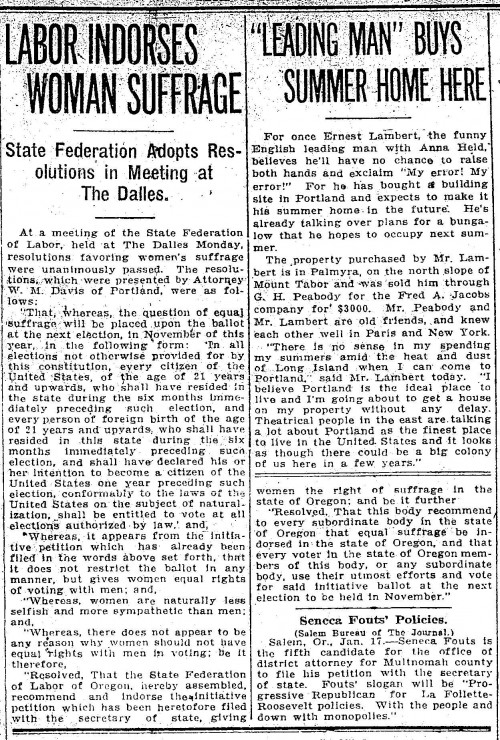"Labor Indorses Woman Suffrage," Oregon Journal, January 17, 1912, 3.

Transcription
LABOR INDORSES WOMAN SUFFRAGE
State Federation Adopts Resolutions in Meeting at The Dalles.
At a meeting of the State Federation of Labor, held at The Dalles Monday, resolutions favoring women’s suffrage were unanimously passed. The resolutions, which were presented by Attorney W. M. Davis of Portland, were as follows:
“That, whereas, the question of equal suffrage will be placed upon the ballot at the next election, in November of this year, in the following form: ‘In all elections not otherwise provided for by this constitution, every citizen of the United States, of the age of 21 years and upwards, who shall have resided in the state during the six months immediately preceding such election, and every person of foreign birth of the age of 21 years and upyards, who shall have resided in this state during the six months immediately preceding such election, and shall have declared his or her intention to become a citizen of the United States one year preceding such election, comformably to the laws of the United States on the subject of naturalization, shall be entitled to vote at all elections authorized by law,’ and,
“Whereas, it appears from the initiative petition which has already been filed in the words above set forth, that it does not restrict the ballot in any manner, but gives women equal rights of voting with men; and,
“Whereas, women are naturally less selfish and more sympathetic than men; and,
“Whereas, there does not appear to be any reason why women should not have equal rights with men in voting; be it therefore,
“Resolved, That the State Federation of Labor of Oregon, hereby assembled, recommend and indorse the initiative petition which has been heretofore filed with the secretary of state, giving women the right of suffrage in the state of Oregon; and be it further
“Resolved, That this body recommend to every subordinate body in the state of Oregon that equal suffrage be indorsed in the state of Oregon, and that every voter in the state of Oregon members of this body, or any subordinate body, use their utmost efforts and vote for said initiative ballot at the next election to be held in November.”
1912 January Permalink





